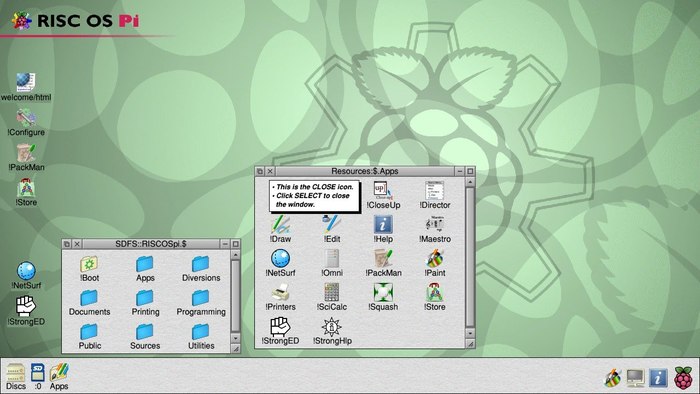RISC OS Open Community presented operating system release RISC OS 5.30, optimized for creating embedded solutions based on boards with ARM processors. The release is based on source texts RISC OS, opened in 2018 by RISC OS Developments (ROD) under the Apache 2.0 license. RISC OS builds formed for Raspberry Pi, PineA64, BeagleBoard, Iyonix, PandaBoard, Wandboard, RiscPC/A7000, OMAP 5 and Titanium boards. Size assemblies for Raspberry Pi is 157 MB.
The RISC OS operating system has been developing since 1987 and is mainly focused on creating specialized embedded solutions based on ARM boards that provide maximum performance. The OS does not support preemptive multitasking (only cooperative) and is single-user (all users have superuser rights). The system consists of kernels And add-on modules, including a module with a simple windowed graphical interface and a set of simple applications. The graphical environment uses cooperative multitasking. NetSurf is used as a web browser.
Advertisement
In the new release:
- Support for the OMAP5 platform has been transferred to the stable category, the formation of the first stable release for which was previously hampered by problems with the video driver.
- For all platforms, full support for the SparkFS FS is implemented with the ability to read and write data.
- Updated RISC OS edition for Raspberry Pi boards. Raspberry Pi 3B, 3A+, 3B+, 4B, 400, Compute Module 4, Zero W and Zero 2W boards support Wi-Fi. Publishing package added to the assembly Ovation Pro. Improved orientation instructions for newbies unfamiliar with RISC OS.
- The collection of applications has been updated, including a new release of the NetSurf 3.11 browser.
- Testing in the system of continuous integration of components Alarm, ShellCLI, FileSwitch, DOSFS, SDFS, FPEmulator, AsmUtils, OSLib, RISC_OSLib, TCPIPLibs, mbedTLS, remotedb, Freeway, Net, AcornSSL, HTTP, URL, Dialler, PPP, NetTime, OmniClient has been put into operation , LanManFS, OmniNFS, FrontEnd, HostFS, Squash and !Internet.
- Deprecated support for Internet 4, the old TCP/IP stack that was used before RISC OS 3.70, in the Freeway, Net, HTTP, URL, PPP, NFS, NetTime, OmniClient, LanManFS, OmniNFS, !Boot, !Internet, TCPIPLibs, and remotedb components , which greatly simplified their maintenance.
- SharedCLibrary adds support for hooks for using static constructors and destructors in C++ code, expanding support for high-level programming languages.
- A new EtherUSB driver has been added for Raspberry Pi, Beagleboard and Pandaboard boards for using USB Ethernet adapters.
- For Pandaboard and Raspberry Pi boards, the HAL (hardware abstraction layer) supports the built-in Wi-Fi controller using the SDIO bus.
- The !Draw application now supports DXF files.
- The !Paint application has added the ability to export images in PNG and JPG formats. Improved brush painting capabilities. Added support for transparency.
- By default, the WimpMan module is enabled, which simplifies the writing of desktop applications.
- The window manager allows you to customize the color and shadows of buttons, as well as change the background of the panel.
- By default, the Tabs and TreeView gadgets are enabled.
- The ability to configure the visibility of system directories has been added to the Filer file manager.
- The maximum RAM disk size has been increased to 2 GB.
- The TCP/IP stack libraries have been partially updated using code from FreeBSD 12.4. The maximum number of network sockets that a single application can open has been increased from 96 to 256.
- Cookie handling has been significantly improved in the HTTP module.
- Added RMFind utility to check support for TCP/IP communication.
- Support for the legacy Xeros NS protocol has been discontinued.
Thanks for reading:
